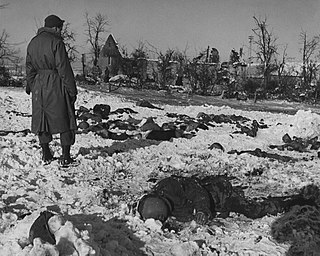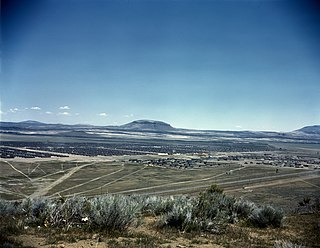Related Research Articles

The officially stated goals of the foreign policy of the United States of America, including all the bureaus and offices in the United States Department of State, as mentioned in the Foreign Policy Agenda of the Department of State, are "to build and sustain a more democratic, secure, and prosperous world for the benefit of the American people and the international community". The United States House Committee on Foreign Affairs states as some of its jurisdictional goals: "export controls, including nonproliferation of nuclear technology and nuclear hardware; measures to foster commercial interaction with foreign nations and to safeguard American business abroad; international commodity agreements; international education; and protection of American citizens abroad and expulsion". U.S. foreign policy and foreign aid have been the subject of much debate, praise, and criticism, both domestically and abroad.

A war crime is a violation of the laws of war that gives rise to individual criminal responsibility for actions by combatants in action, such as intentionally killing civilians or intentionally killing prisoners of war, torture, taking hostages, unnecessarily destroying civilian property, deception by perfidy, wartime sexual violence, pillaging, and for any individual that is part of the command structure who orders any attempt to committing mass killings including genocide or ethnic cleansing, the granting of no quarter despite surrender, the conscription of children in the military and flouting the legal distinctions of proportionality and military necessity.

The Túpac Amaru Revolutionary Movement was a Peruvian Marxist-Leninist guerrilla group which started in the early 1980s. Their self-declared goal was to demonstrate to leftist groups in Peru that sought change through the current government the viability of radical revolution. The MRTA also aimed to provide an alternative to another militant group, the Shining Path, which placed them in direct competition. The group was led by Víctor Polay Campos until he was sentenced to 32 years' imprisonment in 1992 and by Néstor Cerpa Cartolini until his death in 1997.
The Inter-American Commission on Human Rights is an autonomous organ of the Organization of American States (OAS).

The Dirty War is the name used by the military junta or civic-military dictatorship of Argentina for the period of state terrorism in Argentina from 1974 to 1983 as a part of Operation Condor, during which military and security forces and right-wing death squads in the form of the Argentine Anticommunist Alliance hunted down any political dissidents and anyone believed to be associated with socialism, left-wing Peronism, or the Montoneros movement.
Ex parte Mitsuye Endo, 323 U.S. 283 (1944), was a United States Supreme Court ex parte decision handed down on December 18, 1944, in which the Justices unanimously ruled that the U.S. government could not continue to detain a citizen who was "concededly loyal" to the United States. Although the Court did not touch on the constitutionality of the exclusion of people of Japanese ancestry from the West Coast, which it had found not to violate citizen rights in its Korematsu v. United States decision on the same date, the Endo ruling nonetheless led to the reopening of the West Coast to Japanese Americans after their incarceration in camps across the U.S. interior during World War II.

The military dictatorship in Brazil was established on 1 April 1964, after a coup d'état by the Brazilian Armed Forces, with support from the United States government, against President João Goulart. The Brazilian dictatorship lasted for 21 years, until 15 March 1985. The military coup was fomented by José de Magalhães Pinto, Adhemar de Barros, and Carlos Lacerda, then governors of the states of Minas Gerais, São Paulo, and Guanabara, respectively. The coup was planned and executed by the most forefront commanders of the Brazilian Army and received the support of almost all high-ranking members of the military, along with conservative elements in society, like the Catholic Church and anti-communist civil movements among the Brazilian middle and upper classes. Internationally, it was supported by the State Department of the United States through its embassy in Brasilia.

The Civil Liberties Act of 1988 is a United States federal law that granted reparations to Japanese Americans who had been wrongly interned by the United States government during World War II. The act was sponsored by California Democratic congressman and former internee Norman Mineta, Wyoming Republican senator Alan K. Simpson and California senator Pete Wilson. The bill was supported by the majority of Democrats in Congress, while the majority of Republicans voted against it. The act was signed into law by President Ronald Reagan.

The Tule Lake National Monument in Modoc and Siskiyou counties in California, consists primarily of the site of the Tule Lake War Relocation Center, one of ten concentration camps constructed in 1942 by the United States government to incarcerate Japanese Americans forcibly removed from their homes on the West Coast. They totaled nearly 120,000 people, more than two-thirds of whom were United States citizens.

The Center for Constitutional Rights (CCR) is a progressive non-profit legal advocacy organization based in New York City, New York, in the United States. It was founded in 1966 by Arthur Kinoy, William Kunstler and others particularly to support activists in the implementation of civil rights legislation and to achieve social justice.

Asagumo was the fifth of ten Asashio-class destroyers built for the Imperial Japanese Navy in the mid-1930s under the Circle Two Supplementary Naval Expansion Program.
The following article focuses on the movement to obtain redress for the internment of Japanese Americans during World War II, and significant court cases that have shaped civil and human rights for Japanese Americans and other minorities. These cases have been the cause and/or catalyst to many changes in United States law. But mainly, they have resulted in adjusting the perception of Asian immigrants in the eyes of the American government.

Crystal City Internment Camp, located near Crystal City, Texas, was a place of confinement for people of Japanese, German, and Italian descent during World War II, and has been variously described as a detention facility or a concentration camp. The camp, which was originally designed to hold 3,500 people, opened in December 1943 and was officially closed on February 11, 1948.
Wayne Mortimer Collins was a civil rights attorney who worked on cases related to the Japanese American evacuation and internment.
William Minoru Hohri was an American political activist and the lead plaintiff in the National Council for Japanese American Redress lawsuit seeking monetary reparations for the internment of Japanese Americans during World War II. He was sent to the Manzanar concentration camp with his family after the attack on Pearl Harbor triggered the United States' entry into the war. After leading the NCJAR's class action suit against the federal government, which was dismissed, Hohri's advocacy helped convince Congress to pass legislation that provided compensation to each surviving internee. The legislation, signed by President Ronald Reagan in 1988, included an apology to those sent to the camps.
Karen Parker is an attorney based in San Francisco specializing in human rights and humanitarian law. Since the early 1980s, she has contributed to the evolution of international legal norms in the fields of economic sanctions, use of weaponry, environment as a human right, sexual slavery, and the rights of disabled persons. She regularly testifies at the United Nations Human Rights Council, formerly the United Nations Commission on Human Rights, and has served as an expert witness in disputes concerning armed conflict law, including conflicts in Central America, Iraq and Afghanistan. She has also worked as a mediator on behalf of several resistance movements active in the world today, especially Sri Lanka, Burma (Myanmar), Kashmir, Maluku, and Iran.
Liu Huang A-tao was a Taiwanese activist. She was one of thousands of women from Japanese occupied Taiwan who were forced into sexual slavery as comfort women by the Japanese military during World War II. Liu Huang became the first Taiwanese woman to sue the Japanese government for compensation and a public apology in 1999, a move which united her with eight other comfort women survivors. Her public campaign and push for compensation earned her the nickname Grandma A-tao.
Aiko Herzig-Yoshinaga was a Japanese American political activist who played a major role in the Japanese American redress movement. She was the lead researcher of the Commission on Wartime Relocation and Internment of Civilians (CWRIC), a bipartisan federal committee appointed by Congress in 1980 to review the causes and effects of the Japanese American incarceration during World War II. As a young woman, Herzig-Yoshinaga was confined in the Manzanar War Relocation Center in California, Jerome War Relocation Center in Arkansas, and Rohwer War Relocation Center also in Arkansas. She later uncovered government documents that debunked the wartime administration's claims of "military necessity" and helped compile the CWRIC's final report, Personal Justice Denied, which led to the issuance of a formal apology and reparations for former camp inmates. She also contributed pivotal evidence and testimony to the Hirabayashi, Korematsu and Yasui coram nobis cases.
Isamu 'Art' Carlos Shibayama was a Peruvian-American civil rights activist who fought for the rights of Latin Americans of Japanese ancestry who were illegally interned in the United States during World War II.
References
- ↑ "World War II", Carl J. Schneider. Dorothy Schneider. Infobase Publishing, 2003. ISBN 0-8160-4484-8, ISBN 978-0-8160-4484-9. p. 256
- ↑ "Japanese Latin Americans Imprisoned By US During World War II Win Bittersweet Victory From Department of Justice", ACLU. June 12, 1998. Accessed June 7, 2011
- ↑ Nakagawa, Martha (August 13, 2020). "Rights commission rules in favor of Japanese Latin Americans kidnapped during WWII". Nichi Bei Times . San Francisco. Retrieved October 22, 2022.